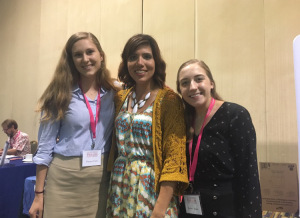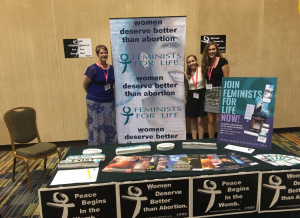What does it truly mean to be pro-life?
A week ago, I would have spewed off the same trite response without a second thought: supporting life from conception to natural death.
While that is true, it should not stop there.

Kathryn and me at the FFL booth.
This weekend, Kathryn Baker and I had the incredible opportunity to attend the Second Annual Pro-Life Women’s Conference through our internships with Feminists for Life. Hosted by Abby Johnson’s organization, And Then There Were None, and Annie Celotto’s Alice Paul Group, the PLWC advocates that “women’s empowerment cannot be attained by the oppression of other human beings.” In other words, the lives of children should not have to be taken away for women to be successful, fulfilled, and powerful.Unfortunately, that’s not the message our culture portrays. Oftentimes, I hear pro-choice people claim that a woman cannot achieve success in a career if she is pregnant; rather, her pregnancy will just hinder her success in the workforce. While interning for Feminists for Life this summer, I began to perceive why this argument is fundamentally inaccurate. The ability to give birth is inherent in a woman’s nature. It is what sets her apart from a man. In claiming that a woman cannot be pregnant, or be a mother, and pursue an education or a career, we are claiming that a woman needs to be more like a man in order to succeed. But being a feminist means embracing a woman’s natural differences from men and celebrating these differences. It does not require rejecting the natural abilities that set women and men apart in order to fit the mold shaped by society. A real feminist supports women in the workforce, ensuring it is perfectly possible for a mother to also be a chief executive officer or president of a company.

Meeting Melissa Ohden
Just as there are multiple aspects to feminism, the pro-life movement is multi-faceted as well. Being pro-life is more than just working to end abortions or opposing capital punishment, although these efforts are extremely important. In the words of Melissa Ohden, who survived her mother’s saline abortion, being pro-life is wanting “better for children, better for parents, and better for society.” For our movement to succeed, we cannot support the children while chastising and ostracizing the women who get pregnant and believe abortion is their only option.So why do women get abortions? What is the failing in our society that make girls feel like they cannot complete college while pregnant or afford to raise a baby. What makes them believe that giving up their child for adoption would be worse than abortion?
As pro-life people, we must address the underlying issues that cause women to even consider abortion as an option. Once we solve these, no woman will feel as if abortion is the best, or only, option. Being pro-life means advocating for more resources for pregnant students on college campuses. Being pro-life means informing women that adoption is a great option because it gives children a shot at a wonderful future. Being pro-life means speaking out against the belief that the life of someone with a disability is not valuable and denouncing the over 90% abortion rate for children with a prenatal diagnosis of disability.
It is equally important to understand the pro-choice women supporting those confused mothers and the women who perform the abortions to end those babies’ lives. After all, we can all agree abortion is an evil. But no one wakes up wanting an abortion and no one leaves an abortion clinic proud of taking the life of a child. In the words of Melissa Ohden, being pro-life also means being pro-love by showing love to women who have had abortions or who have worked at abortion clinics. As expressed by Lacey Buchanan, women’s “liberation does not come at the expense of other people.” Likewise, the pro-life movement does not come at the expense of exclusion or judgement towards people who disagree. For it is only when we come together as a movement, solve the issues that push women towards abortion, and combat these issues with love that we will ultimately end abortion. It is only then that we can truly “Love Them Both.”
Havens Clark
COL ’20
RTL President
Advertisements Share this:




